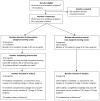Educating resident physicians using virtual case-based simulation improves diabetes management: a randomized controlled trial
- PMID: 25006707
- PMCID: PMC4245358
- DOI: 10.1097/ACM.0000000000000406
Educating resident physicians using virtual case-based simulation improves diabetes management: a randomized controlled trial
Abstract
Purpose: To test a virtual case-based Simulated Diabetes Education intervention (SimDE) developed to teach primary care residents how to manage diabetes.
Method: Nineteen primary care residency programs, with 341 volunteer residents in all postgraduate years (PGY), were randomly assigned to a SimDE intervention group or control group (CG). The Web-based interactive educational intervention used computerized virtual patients who responded to provider actions through programmed simulation models. Eighteen distinct learning cases (L-cases) were assigned to SimDE residents over six months from 2010 to 2011. Impact was assessed using performance on four virtual assessment cases (A-cases), an objective knowledge test, and pre-post changes in self-assessed diabetes knowledge and confidence. Group comparisons were analyzed using generalized linear mixed models, controlling for clustering of residents within residency programs and differences in baseline knowledge.
Results: The percentages of residents appropriately achieving A-case composite clinical goals for glucose, blood pressure, and lipids were as follows: A-case 1: SimDE = 21.2%, CG = 1.8%, P = .002; A-case 2: SimDE = 15.7%, CG = 4.7%, P = .02; A-case 3: SimDE = 48.0%, CG = 10.4%, P < .001; and A-case 4: SimDE = 42.1%, CG = 18.7%, P = .004. The mean knowledge score and pre-post changes in self-assessed knowledge and confidence were significantly better for SimDE group than CG participants.
Conclusions: A virtual case-based simulated diabetes education intervention improved diabetes management skills, knowledge, and confidence for primary care residents.
Figures

Comment in
-
A Missed Opportunity to Achieve Excellence in Residency Education.Acad Med. 2015 Sep;90(9):1181. doi: 10.1097/ACM.0000000000000819. Acad Med. 2015. PMID: 26307922 No abstract available.
-
In Reply to Wayne et al.Acad Med. 2015 Sep;90(9):1181-2. doi: 10.1097/ACM.0000000000000847. Acad Med. 2015. PMID: 26307923 No abstract available.
References
-
- Hoerger TJ, Segel JE, Gregg EW, Saaddine JB. Is glycemic control improving in U.S adults? Diabetes Care. 2008 Jan;31:81–86. - PubMed
-
- Berger JE, Ahmann AJ, Balfour DC, et al. Treating to target: implementing an effective diabetes care paradigm for managed care. Am J Manag Care. 2010;16(Suppl Treating):S4–35. - PubMed
-
- Phillips LS, Branch WT, Cook CB, et al. Clinical inertia. Ann Intern Med. 2001;135:825–834. - PubMed
-
- Peyrot M, Rubin RR, Lauritzen T, et al. Resistance to insulin therapy among patients and providers: results of the cross-national Diabetes Attitudes, Wishes, and Needs (DAWN) study. Diabetes Care. 2005;28:2673–2679. - PubMed
Publication types
MeSH terms
Grants and funding
LinkOut - more resources
Full Text Sources
Other Literature Sources
Medical
Molecular Biology Databases

